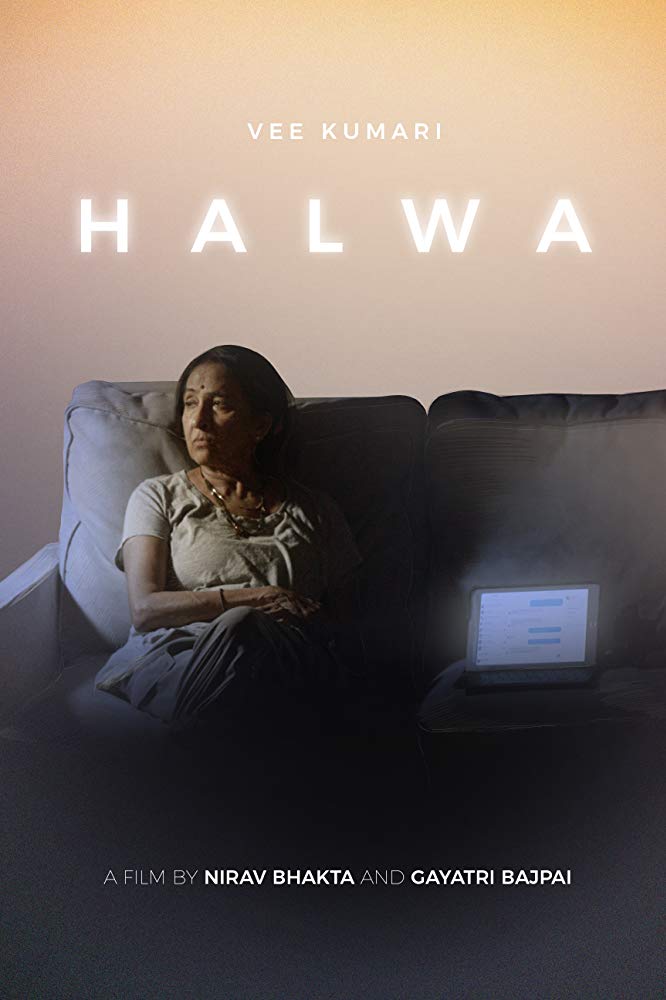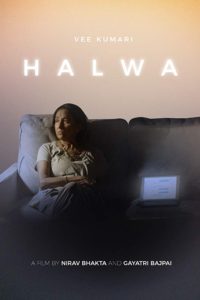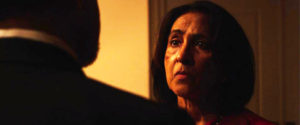
South Asian Independent Short Film Review “Halwa”
WATCH THE TRAILER HERE
First, the Recap:
What is it that stirs the past to life again? Those events, those people, those moments we hold within our very being that remain intact, even if dormant, until such time as that one occurrence manifests that brings it all rushing back into the forefront of our minds, hearts, and souls. However, in these reminders of what has been left behind come about, will it actually be to our benefit, or to our detriment when trying to find joy in present sorrow? For Sujata (Vee Kumari), the day of her wedding anniversary has arrived. Yet, it isn’t in itself anything she genuinely longs to experience, having felt trapped in a broken marriage to her husband, Dr. Chopra (Asit Kumar Vyas).
The day takes a turn, though, when she randomly discovers about the passing of a dearly cherished childhood companion Premila’s (Sonal Shah) spouse. Even as she corresponds via Facebook with friends Lalita (Samiya Khan) and Rukmini (Aishveryaa Nidhi) about the loss while likewise conversing with her daughter Anjali (Sanchita Malik), Sujata’s real intent lies in reconnecting with Premila and the long-ago, but deep, bond they shared. While her domineering husband cares very little for her attempts to be in contact with Premila and shows it in not so subtle ways, Sujata stands her ground, and in doing so, makes every effort to relish each moment and even finds the significance in sharing a treasured dish the two coveted in their youthful days.
Next, my Mind:
It is a study in human nature, the pursuit of what it is to be truly loved, the power of memory and past connections, present troubles and yesteryear’s treasures, and the beauty of relationships, whether tolerated or not, that transcend it all in this 16-minute indie short film effort from writer/director/producer/editor Nirav Bhakta and writer/director/editor Gayatri Bajpai, winners of this year’s HBO Asian Pacific American Visionaries, their film attaining top honors. In the scope of the United States, but truthfully the world over, the general concept of loveless marriages is not an uncommon theme to portray via the medium of film. Yet here, the harsh realities of it are so understatedly and overtly displayed through the interactions between Sujata and her husband while also being emphasized through her virtually desperate endeavors to re-discover a past association from childhood with whom she had a very committed and loving bond beyond just basic friendship, yet which was totally misunderstood, putting an even more contemporary and candid relevance to the narrative being presented.
Given the current acceptances and controversaries surrounding the thematic avenue being explored, albeit with deftly subtle yet very impactful execution, it only makes her ability to hide it from her husband that much more tenuous to handle, especially in light of his initial reactions when he surmises what she might be up to and assuredly doesn’t approve of even the slightest amount of attachment they still harbor towards each other. But the real strength of said binds are not so easily thwarted or broken, even over time, and how Sujata chooses to stand firm, even in the face of ridicule and even physical harm from her husband, and it actually makes how the film’s ultimate finale comes about very inspiring and triumphant in how its portrayed. In the grander sphere the narrative encompasses, the film certainly speaks to couples who’ve had any children that have since grown up and left the house, “empty nesters” as they’re called, in illustrating that once that “buffer” (intentional or not) of children is gone, it shines a revealing light on the real depth of a couple’s love (or lack thereof) when all they suddenly have is each other to deal with.
Additionally, the film wonderfully dives into the underlying but by no means less important sense of just how potent memory can be in circumstances like what is shown, given so much of the interactions depicted don’t actually involve the characters in question being in physical proximity to one another, other than Sujata and her husband. So, to really be able to convey the depth of emotional turmoil and volatility that’s happening throughout this film, it relies heavily on both what we can see and what we can only hear via the voices of Sujata’s friends, her daughter (whom we do see via video call, granted), and only partially witnessed Facebook chats. For me, though, this is all expertly conceived and carried out, as I still felt the highs, the lows, the joys, and tensions the film presents quite fully through the way Bhakta and Bajpai chose to deliver it, which really only made the times we directly see Sujata and her husband together more evocative and riveting, as it becomes the real picture of the ramifications involved with her actions and their purposeful intent with re-establishing connection with Premila against Dr. Chopra’s wishes.
When it comes down to it, and this of course is not at all taking a single thing away from any of the film’s amazing cast, but this truly is a showcase for Kumari in her wonderfully poignant and strongly believable performance as Sujata, a woman who has known a life that’s been filled, we get the feeling, with both a sense of much joy, yet equally saddening regret, even as she comes to what should be one of the more sparkling moments-her wedding anniversary. Yet, it is marred with the sheer fact that she’s been in a union filled with being controlled and most likely maltreated in some form by her autocratic spouse, and therefore it is no wonder upon learning of a dearly beloved childhood friend’s pain and loss, she immediately feels the need to reach out. When she does this, though, it digs up the buried but still-present feelings for Premila she’s harbored since they were girls, which is a portrait of hidden but highly devoted love. This facet of her past arising again, it brings high conflict into being with her husband, though Sujata maintains her poise and makes an even more defiant statement to solidify nothing and no one will stop her. It’s a fantastically enacted role that, as mentioned above, utilizes an understated intensity on multiple emotional levels that Kumari brings out with such realistic intentionality throughout the film.
Vyas also puts forth a very quietly commanding performance in his role as Dr, Chopra, Sujata’s husband whom we can tell from the start has had absolute power and control in the household, even when not showing anything blatantly on the surface. His overall demeanor speaks volumes to how much he has things his way, and the means by which he relates to Sujata when they are together perfectly defines this. Seemingly preoccupied with everything and anything else but her, his attentions get drawn her way upon beginning to figure out what she’s up to in having reached out to Premila, even despite Sujata’s attempts to hide that fact. His methods of dissuading her to continue the re-connecting is not so subdued, but all it really does is fuel the fire within her to rebel against his wishes. Then, even in view of his own “best decisions” on how to handle it, the results are not what he sought, and it puts an interesting exclamation point on the view of the modern notions of gender roles in relationships and/or marriage. Vyas does a splendid job in presenting this picture of a traditional man being confronted with present-day actuality.
Supporting turns arrive from Malik as the couple’s daughter Anjali, with whom Sujata has a video call chat with during the events as they transpire, voice-only “appearances” from Shah as Sujata’s long past, but never forgotten, childhood partner Premila, the catalyst for so much of the drama that occurs, plus Khan and Nidhi as Sujata’s close friends Lalita and Rukmini. Additional appearances visually are made by Renu Razdan and Puja Gupta as the younger versions of Sujata and Premila in flashback sequences. In total, with a beautifully rendered visual appeal, emotive music score from Jacob Yoffee and Lauren Pham, and its life lessons on love’s depths, the consequence of misunderstandings, recognizing and re-discovering bonds that overcome all barriers, and realizing what’s most important in the grand scheme of this short time we have, “Halwa” is a magnificently crafted short film that does total justice to the genre and well-warrants the award it achieved for its makers, sending up another warning flare to mainstream cinema that independent film is here, making its marks and, more importantly, here to stay, a force to be reckoned with.
As always, this is all for your consideration and comment. Until next time, thank you for reading!




Thank you for the wonderful review of our film, and of the cast.i was touched by your comment that compared removing my make-up to once and for all removing the oppression!
Thanks again!
Vee Kumaril
Permalink
Permalink